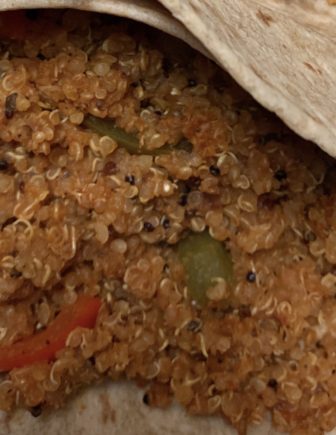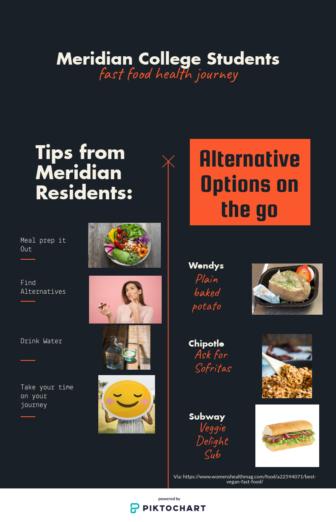It’s so hard to say goodbye—to junk food. With many stressors of college life, from work to classes, there are so many doors open to just get a quick fix, of food that is. In Ingham and Clinton Counties, there are over 50,000 college students between Michigan State University and Lansing Community College, according to both institutions’ websites.
Within these college towns, there is constant easy access to fast food restaurants including McDonalds, Taco Bell, Chick-fil-A, etc., but the options for organic foods or even vegan options run short.
These limiting options don’t only affect these student’s physical and learning capabilities throughout the day, but their overall mental health.
Sarah Taylor, a licensed mental health clinician and owner of Taylored Therapy LLC, sees college students in her office often and recognizes that fast food can affect their moods.
“I definitely think fast food plays a role in mental health for college students or anyone in general,” said Taylor “It meets the immediate need for if I am hungry, this is something that satisfies me temporarily but because of the fats … I think it affects self-esteem, energy level because it’s not a natural food source.”
Although fast food can affect college students throughout the day, said Taylor, some students are finding ways to fix this. With healthy and organic eating becoming more normalized through social media, students within college spaces are meal prepping, requesting more organic options on their own campuses, and even becoming vegans.
Jade Greear, a recent transitioning vegan and student in the Meridian Township area, knows the scarce struggle of finding quick and healthy options in the area. When she began her transition, over six months ago, trying to eliminate all the fast food options in her normal eating routines became extremely difficult.

Jade Greear of Meridian Township says quinoa tacos are a great alternative for a transitioning vegan.
“I originally transitioned because I began to feel terrible daily, with physical and mental health, and needed a change,” said Greear. “I was never brought up as a vegan so trying to figure out where to start became difficult, the main struggle was being able to find options for when I am on the go.”
With Greear being such a busy student, having a job, classes, and involvement in student organizations, most times it became aggravating to not have many options for quick foods to turn to. When she moved off campus, it became easier for her to make her own meals and find a routine of meal prepping that made it easier for her through the week.
While going through this transition, Greear was available to get some of her friends to be a part of her journey. One in particular being aspiring medical student, Jala Jefferson, who decided to partake in the transition, as well.
Greear and Jefferson were able to start their journey together through recipe exchanges and meal prepping nights. Through their constant journey of finding recipes for their taste and needs, they decide to formulate their own Instagram page, “The Barely Vegans.”
“We started Barely Vegans to give students like us the chance to work together in eating healthier and finding options that aren’t traditional vegan options,” said Jefferson. “I am not fully vegan yet like some people, but I am still trying to get there. I am just happy to be on the journey with someone else and our followers on Instagram that can support us and hold us accountable.”
Greear and Jefferson both find their journey completely fulfilling in which they are not only becoming more positive physically, but they are witnessing changes in their mental health. Jefferson, in particular, indicated she felt fulfilled by being able to “focus more” and “work through the day.”
While health professional Taylor said fast food can have an effect on mental health in not just students, but everyone; Demian White has seen first-hand how the effects can weigh in on your progress and overall health.
White, a graduating nursing student, has studied the effects of fast food on the body and even experienced it affecting herself as a dancer. Being a part of the Michigan State University dance team, White knows she must keep a healthy diet in order to maintain her stamina and give a great performance.

There are always ways to eat healthier at your favorite fast food places.
“Entering the health field, I want to encourage people—people of color, specifically— to be aware of their diets and the effects that it can have on us,” said White. “I have started to even encourage my friend to take care of their bodies, and hopefully, when I am a nurse, they’ll listen even more.”
Although White is an advocate for eating healthy, she also knows that this reality is not true for everyone and encourages people to take in their consumption of fast food wisely and occasionally.
“I rarely indulge, but if I do it’s organic or something I know won’t completely weigh on my health,” said Demian.